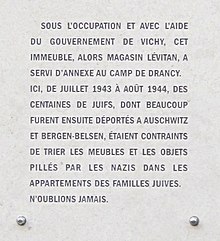Lévitan camp
Lager Ost (more recently Lager Ost Lévitan , or Lager Lévitan for short ) was the name given to a department store in Paris that was confiscated and closed by the Vichy regime in 1941 during the occupation of France in World War II (85/87 rue du Faubourg-Saint-Martin, 10 Arrondissement ), which was confiscated by the West Department in 1943 as part of the M-Aktion and used as an interim storage facility for furnishings from looted Jewish households and from July 1943 to August 1944 as a labor camp for 180 to 250 mostly Jewish slave laborers . It was one of the three subcamps of the Drancy collection camp .
The name addition Lévitan is derived from the earlier furniture store Magasin Lévitan .
history
The store
The English department store chain Aux Classes Laborieuses Ltd , founded in 1897 and which had already opened its first branch in Paris near the Gare de l'Est in an older building on Boulevard de Strasbourg (no. 46/48), acquired the rear branch in 1899 Facade of the same adjoining property and had a modern department store built there with an entrance accessible from rue du Faubourg-Saint-Martin (No. 85-87). The facade, designed by the architect Jacques Hermant with the inscription Aux Classes Laborieuses, was awarded by the city of Paris in 1900.
As a result of the recession caused by the First World War , the English retail chain closed the department store, left it temporarily empty, then rented it to a printer and finally offered it for sale.
The buyer was the Jewish entrepreneur Wolf or Wolff Lévitan (1885–1966), owner of the Lévitan furniture factory founded in 1920 and a furniture store on Boulevard de Magenta (No. 63).
The East Camp
Kurt von Behr was deployed in 1940 by Alfred Rosenberg in Paris to steal “abandoned cultural property from Jews” as head of the main organization and personnel department in the task force created for this purpose, Reichsleiter Rosenberg , West Department . From January 1942 he headed the M-Aktion in Paris , the robbery of furniture in France for German purposes (enrichment, replacement for bombed out, etc.), which lasted until August 1944.
For this purpose, the camps Lévitan (also known as Camp East ), Austerlitz (43, quai de la Gare in the 13th arrondissement) and Bassano (2, rue de Bassano in the 16th arrondissement) were set up as branch offices of the Drancy camp. About 120 Jewish internees were forced to work and live in the Lévitan camp. In the former furniture store Lévitan, which belonged to the Jewish merchant Wolf Lévitan (* 1885), and in the other branch offices, the confiscated furniture from Jewish residents of Paris was stored and brought to the German Reich in more than 600 train transports .
literature
- Jean Colson / Marie-Christine Lauroa (eds.): Dictionnaire des monuments de Paris . Editions Hervas, Paris 2003 (1st edition 1992), ISBN 2-84334-001-2 .
- Sarah Gensburger: Essai de sociologie de la mémoire: le cas du souvenir des camps annexes de Drancy dans Paris. In Genèses , 4/2005 (n ° 61), pp. 47-69, ISBN 9782701141794 , online .
Web links
- Spoliés! L'Aryanisation économique en France 1940–1944 , exhibition of the Musée de la Résistance et de la Déportation Grenoble on the theft of Jewish property and the economic Aryanization in France, in the former Palais du Parlement du Dauphiné, Grenoble, June 1 - December 15, 2010 (French text)
Individual evidence
- ^ Camp East Lévitan. Annexe du camp de Drancy (German: Lager Ost Lévitan, subcamp of the transit camp Drancy) illustrated article in the database ajpn.org (French text)
- ↑ Entry Wolf Lévitan in the database ajpn.org (French text)
- ↑ Patrick Eveno: Aux Classes Laborieuses , Les Infos du 10e , n ° 21, July 1, 2014 (French text)

